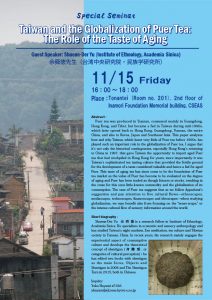 Guest Speaker: Shuenn-Der Yu(Institute of Ethnology, Academia Sinica 余舜德先生 (台湾中央研究院・民族学研究所)
Guest Speaker: Shuenn-Der Yu(Institute of Ethnology, Academia Sinica 余舜德先生 (台湾中央研究院・民族学研究所)
Venue: Tonantei (Inamori Memorial Bldg., 2nd floor, north side)
Date & Time: November 15th 2019, 4:00p.m.-6:00p.m.
Title: Taiwan and the Globalization of Puer Tea: The Role of the Taste of Aging
Abstract:
Puer tea was produced in Yunnan, consumed mainly in Guangdong, Hong Kong, and Tibet, but became a fad in Taiwan during mid-1990s, which later spread back to Hong Kong, Guangdong, Yunnan, the entire China, and also to Korea, Japan and Southeast Asia. This paper analyzes how and why Taiwan, which knew very little of Puer tea before 1990s, has played such an important role in the globalization of Puer tea. I argue that it’s not only the historical contingencies, especially Hong Kong’s returning to China in 1997, that gave Taiwan the opportunity to import aged Puer tea that had stockpiled in Hong Kong for years; more importantly it was Taiwan’s sophisticated tea tasting culture that provided the fertile ground for the development of a taste considered valuable and hence a fad for aged Puer. This taste of aging tea has since come to be the foundation of Puer tea market as the value of Puer has become to be evaluated on the degree of aging and Puer has been traded as though futures or stocks, resulting in the craze for this once little-known commodity and the globalization of its consumption. The case of Puer tea suggests that as we follow Appadurai’s suggestion and pay attention to five cultural flows—ethnoscapes, mediascapes, technoscapes, financescapes and ideoscapes—when studying globalization, we may benefit also from focusing on the “sense-scape,” or the intense cultural flow of sensory information around the world.
Short biography:
Shuenn-Der Yu 余舜德is a research fellow in Institute of Ethnology, Academia Sinica. He specializes in economic and sensory anthropology and has studied Taiwan’s night markets, Zen meditation, tea culture and Tibetan society in Yunnan, China. In recent years, his research mainly engages the experiential aspect of consumptive culture and develops the theoretical concept of shentigan (身體感, or categories of cultural perception);he has edited two books with shentigan as the main focus, Objects and Shentigan in 2008 and The Shentigan Turn in 2015, both in Chinese.
Inquiry: Yoko Hayami x7336 yhayami[at]cseas.kyoto-u.ac.jp